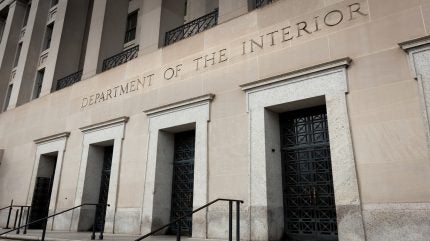
The US Department of the Interior (DOI) has announced the end of “preferential treatment” for subsidy-dependent wind and solar energy projects.
This decision is in line with President Trump’s Energy Dominance agenda and follows the signing of Executive Order 14315 and the implementation of the One Big Beautiful Bill Act.

Discover B2B Marketing That Performs
Combine business intelligence and editorial excellence to reach engaged professionals across 36 leading media platforms.
The DOI will now subject all decisions and actions related to wind and solar energy facilities to an elevated review process by the Office of the Secretary, who will ensure that all evaluations are thorough and deliberative.
This includes leases, rights-of-way, construction and operation plans, grants, consultations, and biological opinions.
Acting assistant secretary for lands and minerals management Adam Suess said: “Today’s actions further deliver on President Trump’s promise to tackle the Green New Scam and protect the American taxpayers’ dollars.
“American Energy Dominance is driven by US-based production of reliable baseload energy, not regulatory favouritism towards unreliable energy projects that are solely dependent on taxpayer subsidies and foreign-sourced equipment.”

US Tariffs are shifting - will you react or anticipate?
Don’t let policy changes catch you off guard. Stay proactive with real-time data and expert analysis.
By GlobalDataThe DOI aims to eliminate fee discounts for existing and future wind and solar projects, addressing provisions in the One Big Beautiful Bill Act.
This move is expected to end years of subsidies for what the administration considers economically unviable energy development.
By removing these subsidies, the DOI intends to level the playing field for what it deems dispatchable, cost-effective, and secure energy sources such as clean coal and domestic natural gas.
The administration views this as a return to common-sense permitting standards that will support national security, grid stability, and American job creation.
Previously, the DOI had announced plans to rescind the Bureau of Land Management’s clean energy regulation. This action is seen as a step towards reducing regulations, stimulating economic growth, promoting energy independence, and expanding land use.



